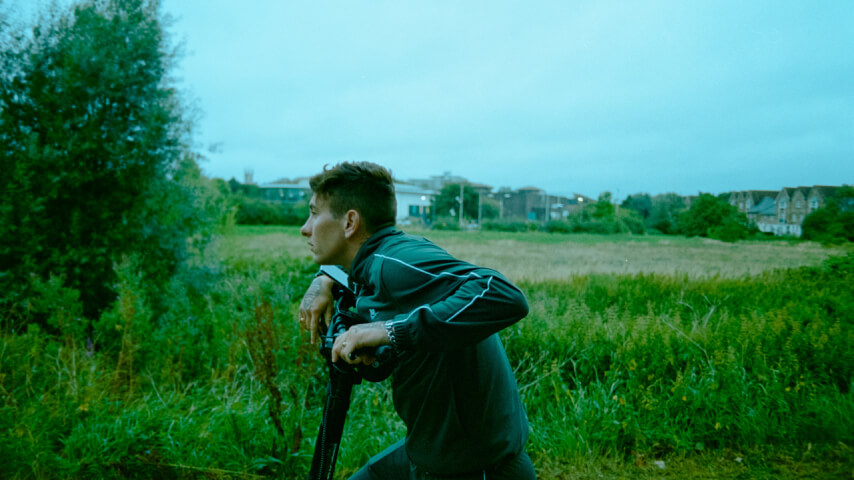In 2016, Andrea Arnold made a bold pivot away from her uniquely British sensibility with American Honey, a Midwestern road movie about a group of nomadic youths who drive around selling magazine subscriptions. Despite the stark regional shift in perspective, the film is emphatically in line with Arnold’s distinct brand of kitchen-sink realism: non-professional actor Sasha Lane played the lead (with several others scouted for supporting roles), the dialogue was rife with improvisation, and it was shot chronologically in order to foster an increased sense of comfort among the cast.
Bird, Arnold’s first narrative feature since American Honey, marks another surprising change for the director: as opposed to channeling the gritty naturalism that has served her career so well, she dabbles in a bizarre surrealism that feels overwrought as a metaphor for survival. While Bird still employs an interest in socially vulnerable characters, its viewpoint feels less rooted in authentic struggle than in sensationalistic strife.
12-year-old Bailey (Nykiya Adams in her first-ever acting role) lives in a squat in Gravesend, Kent—located on the coast just east of London—with her young, tattoo-covered father Bug (a predictably on-point Barry Keoghan) and ne’er-do-well older half-brother Hunter (Jason Buda). Bailey has an omnipresent aura of discomfort, which stems from a critical lack of privacy (her “room” is simply a makeshift blanket fort) and is compounded by the fact that the cramped quarters will now be shared with Bug’s soon-to-be wife (Joanne Matthews), who he’s been dating for just three months. Worst of all, the tomboyish tween is expected to don a gaudy leopard print catsuit as a bridesmaid, a prospect that causes her to chop off her coily tresses out of sheer rebellion.
Considering her objective lack of autonomy, Bailey is, naturally, fascinated by creatures with free range. She lovingly captures images of butterflies, bees, horses, and, of course, birds on her iPhone, which she later views within her fort via a dinky projector. It’s during an encounter with majestic ponies in an open field that Bailey crosses paths with a kilt-wearing stranger. At first wary—even whipping out her phone to capture his visage on camera as self-defense—Bailey is nonetheless charmed by the lithe, lisping man, who introduces himself as Bird (an unfortunately off-kilter Franz Rogowski).
Surprisingly, the pair have an unexpected connection. Bird is looking for the father that abandoned him many years ago, and it turns out that the man’s last known whereabouts are the building that Bailey used to live in with her own mother, Peyton (Jasmine Jobson), who has since shacked up with an abuser (James Nelson-Joyce) who terrorizes Bailey’s much younger siblings. In her decision to aid Bird on his quest, Bailey also confronts the familial fractures that have essentially robbed her of a normal childhood. It’s especially fitting, then, that her new friend manages to bring out a sense of cautious whimsy that Bailey hasn’t enjoyed in quite some time.
Bird begins as a survey of squalor and the characters that thrive amid this chaos. There are both moments of despair and levity—misguided kids enact brutal vigilantism in an unjust world; Bug imports a rare toad whose hallucinogenic slime promises big bucks to fund the wedding—yet none of it rings particularly true. For a filmmaker who has otherwise dedicated herself to portraying maligned communities with dignity—even when their actions skew morally shady—there is a surprising lack of nuance in Bird.
Yet if one of Arnold’s artistic specialties is preserved here, it’s her impeccable ear for a soundtrack. Bug belts Fontaines D.C.’s Irish post-punk anthem “Too Real” as he and Bailey zoom in an electric scooter, the toad flying alongside in a plastic bag tethered to Bailey’s wrist. “As it stands, I’m about to make a lot of money!” Bug shouts to the dreary streets of Kent, positive that this amphibian will quell their financial woes. At another pivotal point, Bug’s thuggish friends all come together to serenade the toad with Coldplay’s “Yellow,” as they attempt to play generic tunes to get it to produce its coveted slime. (“How about ‘Murder on the Dancefloor,’ that’s shit!” one friend jokes in an obvious Saltburn reference.)
Aside from Bailey, who juggles conflicting emotions with the convincing veracity of an unmoored teen, none of the other characters are given enough space for further examination. Even Bug, whose parenting style oscillates between borderline maltreatment and doting affection, remains a total mystery by the end of the film. His motives are never adequately probed, but then again neither are any other character’s. Even Bird’s backstory is paltry and essentially inconsequential to the broader narrative, which ends up making sense when his presence veers toward the uncannily surreal during the film’s violent climax. If Arnold had constructed a genuine portrait of this perilous estuary town and its residents in the first place, perhaps the story’s shift toward a mythological fable would have felt more earned. As it stands, it reads more as a cliched fairy tale.
Arnold’s previous feature, an unflinching documentary that follows a dairy cow’s life cycle, was simply named Cow. Its straightforward title promises an unvarnished look into the horrors of industrial agriculture that most citizens would rather stay blissfully unaware of. Though this project similarly features another one-word animal title, there is very little coherence in Bird, which feels tonally out of step with Arnold’s oeuvre. Though it also features non-actors, improvised exchanges, and returns to the director’s native England to scrutinize systemic shortcomings, it does not feel indicative of a time, people, or place that desperately deserves reevaluation. Rather than humanizing its subjects—even when they reveal themselves to be anything but—Bird opts for caricature.
Director: Andrea Arnold
Writer: Andrea Arnold
Starring: Barry Keoghan, Franz Rogowski, Nykiya Adams, Jason Buda, Frankie Box, Jasmine Jobson, Joanne Matthews, James Nelson-Joyce
Release Date: November 8, 2024

